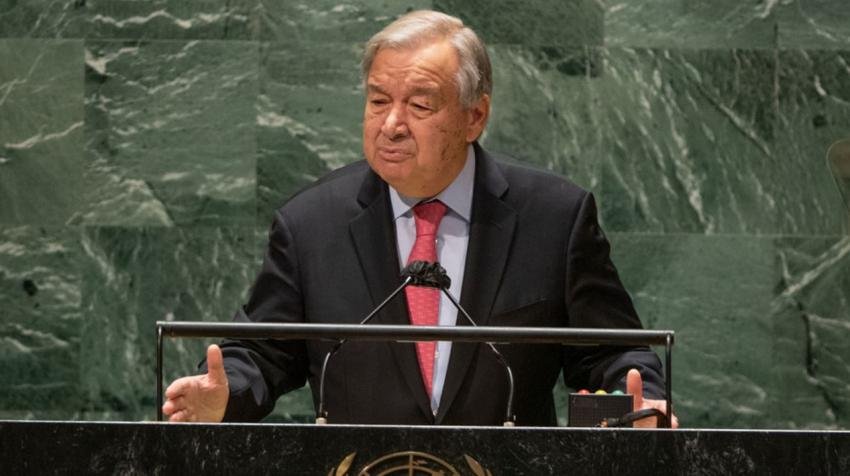Introduction
The Sahel region of West Africa is currently facing escalating security threats that have prompted urgent calls for action, notably from the UN Secretary-General, António Guterres. His recent statements, which were articulated during the convening of the Security Council, underline a precarious situation that poses significant implications for both regional stability and international security. The Sahel is characterized by a unique interplay of socio-economic challenges, political instability, and the growing presence of extremist groups, resulting in a complex security landscape that warrants immediate and coordinated responses from the global community.
Over the past few years, the Sahel has encountered an increase in violence from various non-state actors, including jihadist organizations that have exploited existing vulnerabilities within communities. The broadening scope of these threats, affecting countries such as Mali, Burkina Faso, and Niger, raises serious concerns about the capacity of state institutions to maintain public order and safeguard their populations. The recruitment strategies employed by these extremist groups, particularly among disillusioned youth and marginalized communities, denote a troubling trend that exacerbates regional tensions and contributes to pervasive instability.
The geopolitical landscape in West Africa is further complicated by external influences, including foreign interventions and the engagement of international partners, which often struggle to address the root causes of the ongoing conflict. Guterres emphasizes the critical urgency for collaborative initiatives that prioritize peacebuilding and development in tandem with security measures. This multifaceted approach is essential to mitigate the risks posed by escalating terrorism and prevent a worsening humanitarian crisis in the Sahel. The international community must respond decisively, as the implications of inaction ripple beyond the borders of West Africa, affecting global security frameworks as a whole.
The Critical and Worsening Security Situation
The security situation in the Sahel region, particularly in Mali, Burkina Faso, and Niger, is increasingly precarious due to the escalating activities of various terrorist groups. Groups such as the Jama’a Nusrat ul-Islam wa al-Muslimin (JNIM) have become more aggressive, leveraging the geopolitical disarray to advance their agendas. Their actions have not only led to military confrontations but also severely disrupted the livelihoods of the local populations.
One of the most pressing challenges is the disruption of fuel supplies, a critical resource for both daily life and the economies of these nations. The strategic targeting of fuel supply lines by terrorist entities has created a ripple effect, impacting transportation and trade. This exacerbates the already dire socioeconomic conditions faced by citizens, leading to increased inflation and scarcity of essential goods.
Moreover, military attacks orchestrated by these groups have resulted in considerable loss of life and heightened fears among the population. Such violence undermines trust in local governance structures and security forces, further perpetuating a cycle of instability. The humanitarian crisis stemming from these actions cannot be overstated, with countless civilians being displaced from their homes, leading to a surge in internally displaced persons (IDPs) and refugees. These vulnerable groups often lack access to basic necessities, including food, clean water, and healthcare services, thus intensifying their suffering.
Experts warn of a ‘disastrous domino effect’ if regional coordination fails to address the burgeoning terror threat. The ramifications extend beyond the immediate conflict zones, with the potential for these armed organizations to spread their influence into coastal states, thereby destabilizing larger regions. The urgency for collaborative security measures among these nations and their international partners cannot be overstated, as the situation continues to deteriorate.
Underlying Vulnerabilities and Human Suffering
The Sahel region is characterized by a myriad of socio-economic and environmental vulnerabilities that escalate the threat of terrorism and exacerbate human suffering. As one of the least developed regions in the world, the Sahel faces high levels of poverty, with over 50% of its population living on less than $1.90 per day. This economic hardship contributes significantly to the instability and conflict that plague the area, creating fertile ground for extremist groups seeking to exploit disillusioned communities.
Education in the Sahel is critically lacking, with approximately 20 million children out of school. The closures of schools due to violence and insecurity not only deprive children of education and future opportunities but also contribute to a cycle of poverty and disenfranchisement that militant groups can manipulate. Furthermore, the ongoing conflicts have led to the destruction of numerous healthcare facilities, exacerbating public health crises. In regions where healthcare access is already limited, the impact of these closures is devastating and leads to increased mortality rates from preventable diseases.
Displacement is another grim reality faced by populations in the Sahel, with over 2 million people forcibly displaced as a result of violence and insecurity. These displaced individuals often find themselves in makeshift camps or with host communities that are themselves struggling, leading to heightened competition for resources like food and clean water. Humanitarian needs are on the rise, with organizations estimating that around 30 million people in the Sahel require urgent assistance. This multifaceted crisis underscores the extent of human suffering in the region, highlighting the urgent need for comprehensive solutions that address both immediate humanitarian needs and the underlying socio-economic vulnerabilities that facilitate the growth of terrorism.
Strategies for Addressing the Crisis
The Sahel region faces significant challenges stemming from terrorism, armed conflict, and humanitarian crises, necessitating immediate and coordinated action. The United Nations has proposed a variety of strategies aimed at effectively addressing these pressing issues. One of the most critical approaches involves fostering a unified regional response to the growing threat. This strategy emphasizes the importance of collaboration among countries in the Sahel, encouraging them to share intelligence, resources, and best practices in combating terrorism. Such cooperation is essential for tackling shared security concerns and for creating a resilient regional framework.
Moreover, coordination between national governments and international entities is paramount in providing a robust response to the crisis. International organizations, NGOs, and community leaders must align their objectives and efforts to ensure that resources are applied effectively without duplication of services. Establishing clear communication channels and task forces can facilitate this cooperative environment, ultimately leading to a more localized implementation of security measures.
Addressing the underlying humanitarian needs is also vital. Increased funding from both public and private sectors will enhance the ability to deliver assistance to vulnerable populations affected by the turmoil. By prioritizing humanitarian aid, stakeholders can alleviate immediate suffering while simultaneously working on long-term solutions. Furthermore, creating a coherent development strategy that addresses root causes such as poverty, unemployment, and lack of education is crucial to breaking the cycle of violence. By investing in key sectors, the international community can support the Sahel’s socio-economic stability.
Finally, ensuring a steady commitment from the United Nations will be key to sustained progress. The UN must not only provide ongoing support but also adapt its strategies as the situation evolves, maintaining a flexible approach that respects the sovereignty of affected nations while actively contributing to peace and stability in the region.



